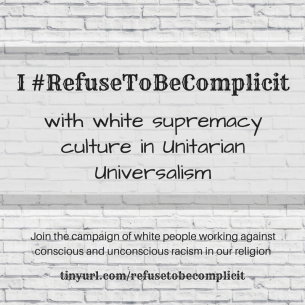 At every point in the history of the United States there have been people whose faith has provided the bedrock for lifelong efforts to end violence, oppression, and inequity—Dorothy Day, Rev. Dr. Martin Luther King, Jr., Malcolm X, Bishop Gene Robinson—and there have been others who have used their religion as a weapon to further these same forces; to maintain the oppressive status quo rather than challenge it.
At every point in the history of the United States there have been people whose faith has provided the bedrock for lifelong efforts to end violence, oppression, and inequity—Dorothy Day, Rev. Dr. Martin Luther King, Jr., Malcolm X, Bishop Gene Robinson—and there have been others who have used their religion as a weapon to further these same forces; to maintain the oppressive status quo rather than challenge it.
In moments of great political and social upheaval, people of faith need to be clear what side of history they are on: the side of the oppressors or the side of the oppressed. The side that points a way forward, toward life, or the side that willfully ignores the suffering all around them and the moving train on which they are passive passengers.
We find ourselves in such a moment now. The election of Donald Trump exposed the true nature of racism within the United States, cutting through the “post-racial” mainstream mythology of the Obama years. Racism and white supremacy are this country’s original sin—a sin with deep roots in religion and how it has been used to justify the dehumanization of Indigenous, African, and other non-white peoples. Is it any wonder, then, that 11 a.m. on Sunday remains the most segregated hour in the nation?
A Liberal Religious Reckoning with White Supremacy
The election created a moment of reckoning for majority white liberal religious traditions. We were starkly reminded that it is not enough to create enclaves of people who profess the inherent worth and dignity of all people. We need to be able to reclaim religion from the far-right, as a force for good. But in order to do this, we also need to wrestle with the very real ways that our churches—and our denominations as a whole—perpetuate the same cultural norms that created the conditions for Trump’s election. We need to grapple with both the subtle and overt workings of racism within our religions.
This grappling has been painful. It is difficult to face the fact that white supremacy is not just about overt bigotry and hatred; that it’s about cultural norms and what is considered simply “the way we do things.” Again and again, people of color have taken on the burden of naming these norms and the ways that they are oppressing people of color and hurting churches and religions as a whole. And again and again, their labor has been rewarded with backlash, defensiveness, and—far too often—spiritual violence.
Two denominations have been emblems of these struggles over the past year: the Unitarian Universalist Association of Congregations (UUA) and Metropolitan Community Churches (MCC). Both have been wracked with fallouts from personnel decisions at the denominational level. In the case of the UUA, Christina Rivera, a Boriqua woman of color and a member of the UUA Board of Trustees, named white supremacy culture in being passed over for a senior denominational staff position in favor of a white male minister. In the case of the MCC, Rev. Elder Darlene Garner, after being a candidate for moderator of the denomination, was fired from her position as the first and only Black person in a senior denominational staff position.
These flashpoints have set off massive chain reactions within both religions. In the UUA, it led to (among other things) the resignation of the president and the top non-elected staff person in the religion and a series of white supremacy teach-ins in the majority of UU congregations. In the MCC, it has led to a campaign of open letters (from within the denomination and from the larger LGBTQ faith community) to MCC national leadership, which has yet to acknowledge that racism was at play in Rev. Garner’s dismissal, much less take positive action to rectify the impacts.
The Urgent Call for Behavior Change
In the past two weeks, the struggles within the MCC and UUA became even more painful. Rev. Candy Holmes announced her resignation from her many vital, volunteer leadership roles within MCC due to racism, white supremacy, and a bullying culture that had become too much to bear. Rev. Holmes is the wife of Rev. Garner. And Christina Rivera was subjected to a brutal act of racist hate mail at her Charlottesville UU church, where she serves as part of the senior staff in a shared ministry model.
In a fierce, heartbreaking, and prophetic blog post, Rivera named the fact that manifestations of racism and white supremacy culture have been occurring for decades and have crushed the ministries of ministers of color everywhere. She called on Unitarian Universalists to level-up, as it were: to recognize how they are part of a culture of complicity and to actively change their behavior, in order to create the change that is overdue.
Rivera specifically named five behavior changes that were needed in her particular congregation and asked readers to consider what needed to change in their churches in order to end the culture of complicity with white supremacy. The behaviors she named were (I’m paraphrasing):
- Stop undercutting the ministry of leaders of color and fully respect and support their leadership decisions.
- Stop using financial pledges as a weapon and fully fund congregational budgets.
- Start working directly—through accountable relationships—to support communities affected by mass incarceration and deportation.
- Celebrate the ministry of leaders of color and communicate your appreciation to powerbrokers.
- Amplify the ministry of leaders of color.
In this moment, within Unitarian Universalism, Metropolitan Community Churches, and liberal religion everywhere, white people of faith have a choice to make: will we tap into the elements of our faith that call us to fight racism and white supremacy culture within our religions, or will we look the other way, comfort ourselves and each other with the certainty that we are the “good guys,” and point fingers away from ourselves toward those who are actively hateful rather than passively complicit?
#RefuseToBeComplicit with White Supremacy Culture
The time is now. In solidarity with my loved ones and comrades who are people of color—particularly those named in this piece, who I’ve reached out to—I am calling on my fellow white people of faith to join a campaign to actively #RefuseToBeComplicit with white supremacy culture in our churches and wider religions. Here’s how:
- Today, right now, make a commitment to one behavior that you will change in order to actively fight against white supremacy culture in your congregation and/or denomination at large.
- Share your commitment on social media with the hashtag #RefuseToBeComplicit and tag five other white people who you want to invite to join you.
- Follow up with those you tag and send them this piece and the resources on white supremacy culture linked below.
- Follow up with those who join you in the campaign and talk about how you can support each other in your behavior changes. Keep checking in with them.
It’s up to you to make sure this campaign creates positive change; that it doesn’t cause additional harm without productive culture shift. Here are some important tips:
- Familiarize yourself with resources on white supremacy culture (like this introduction to the concept of white supremacy as a culture and this list of characteristics of white supremacy culture).
- Remember to make a commitment that constitutes an active behavior change on your part: something you are not currently doing that you commit to doing, or something that you are doing that you commit to not doing anymore.
- Be sincere, humble, vulnerable, and real. Resist the urge to try to make yourself look good, and above all do not be passive aggressive by making a shot across the bow of your church’s leaders. Tag people who you think will sincerely be interested in joining you, not people who you think “need to see this.”
- If the behavior change you want to make is not something that can be shared publicly, write it down and stick it to your fridge, share it with one or more white friends, and ask them to support you in concrete ways.
- Be prepared to respond to backlash from fellow white people about how white supremacy is limited to active white supremacists like the KKK, how your church could never be racist, etc.
- Don’t tag people of color. You might be tempted to tag acquaintances and friends of color so that they know you are in solidarity with them. Don’t do that. They don’t need to see your commitment, they need to see your behavior change—and they also don’t need to be subjected to the backlash that might show up on your post from white friends/acquaintances of yours.
- If you are tempted to apologize for your past behavior, that’s understandable, but remember that it’s not enough to apologize; you must actively change your behavior.
- Compensate people of color for their spiritual, emotional, intellectual, and physical labor—which far more often goes uncompensated. For example, I’ve made a donation to Christina Rivera in recognition of the lessons I’ve learned from her blog posts.
- Know that if you’re uncomfortable, you’re doing it right. If you’re taking a risk, putting skin in the game, giving something up, doing something that doesn’t feel “safe” (read: comfortable) as a white person, you are really doing it right.
In an incredible TED talk, Erika Chenoweth lifts up the fact that it, consistently, only takes 3.5% of a culture to create a nonviolent revolution that can literally overthrow a government. My fellow white people of faith, in your church or denomination, will you join people of color in being the 3.5% that overthrows white supremacy culture? Or will you be complicit in maintaining the present course—or worse, creating the conditions for a different 3.5% to create a backlash that pushes people of color out while destroying our religions?
Refuse to be complicit.


This piece was originally published at Believe Out Loud.
